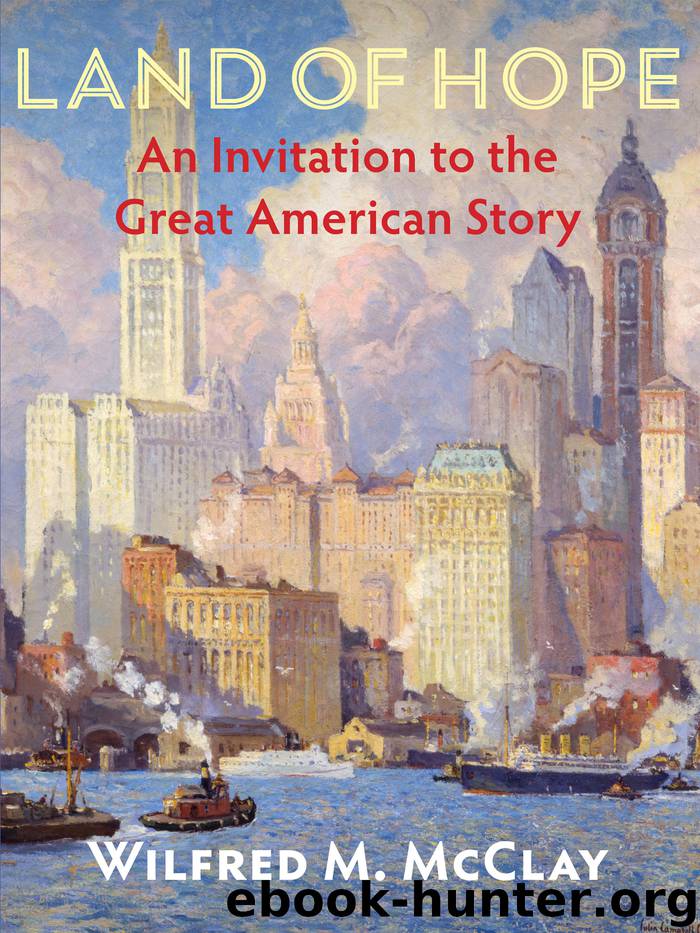Land of Hope by Wilfred M. McClay

Author:Wilfred M. McClay
Language: eng
Format: epub
Publisher: Encounter Books
Published: 2019-06-24T16:00:00+00:00
But what of the great American West, that other mythic land of dreams? Had it been affected by these forces? With its great open spaces, its magnificent mountains and craggy canyons, its mighty rivers and verdant timberlands, surely it was majestically unconquerable, still resolutely the land of individualism and personal freedom so central to the American identity and way of life?
Maybe, but maybe not. The flow of migrants into the region after the Civil War was just as relentless as it was elsewhere, and the growing importance of the mining and cattle industries combined with the reach of the railroads was bringing the West into the more general range of the nation’s consolidating forces. The heyday of the romantic cowboy, riding the open range and steering cattle drives of three thousand head or more northward to cow towns like Sedalia and Abilene, looms large in our imaginations. But it was actually quite brief, only a couple of decades between the end of the Civil War and the late 1880s, as farmers and ranchers began butting up against one another and settled property lines became a necessity. Ironically, the heavy involvement of the federal government in the western states, and federal ownership of roughly half the land of the West, would soon make the West the region least free of federal influence.
Nowhere was that truer than in Indian policy, where the national government’s authority was paramount. Among the most tragic victims of the relentless drive toward national consolidation were the Plains Indians, some 250,000 of them, who faced constant encroachment on their lands. They fought back. Hundreds of battles took place on the Great Plains before these indigenous peoples were subdued. But they eventually lost everything. When the surrendering Chief Joseph of the Nez Perce tribe declared, movingly, “I will fight no more forever,” he was not merely surrendering in combat; he was surrendering an entire way of life. To make matters even worse, he was turning that way of life over to the duplicities and ham-handed mercies of U.S. Indian policy, which sought to “Americanize” the Indians, notably through measures such as the Dawes Severalty Act of 1887, but succeeded only in uprooting them from all they had known. They, too, found their lives in the grip of forces larger than themselves and were left disoriented, displaced, and dispossessed.
Yet belief in the radical freedom and opportunity of the Western frontier continued to be something hard-wired in the American imagination, going back perhaps as far as the imaginations of its first settlers. That perhaps explains why the 1890 Census caused such a stir when it declared, in bland and bureaucratic language, that the western part of the country had so many pockets of settled area that “there can hardly be said to be a frontier line” anymore. More pungently stated, the Census – itself a quintessential agency of a consolidating national regime, a key tool for the administrative ordering of society – had declared that the age of the frontier was over.
Download
This site does not store any files on its server. We only index and link to content provided by other sites. Please contact the content providers to delete copyright contents if any and email us, we'll remove relevant links or contents immediately.
| Archaeology | Essays |
| Historical Geography | Historical Maps |
| Historiography | Reference |
| Study & Teaching |
Underground: A Human History of the Worlds Beneath Our Feet by Will Hunt(11290)
Sapiens by Yuval Noah Harari(4580)
Navigation and Map Reading by K Andrew(4570)
Barron's AP Biology by Goldberg M.S. Deborah T(3646)
The Sympathizer by Viet Thanh Nguyen(3547)
5 Steps to a 5 AP U.S. History, 2010-2011 Edition (5 Steps to a 5 on the Advanced Placement Examinations Series) by Armstrong Stephen(3411)
Three Women by Lisa Taddeo(2931)
The Comedians: Drunks, Thieves, Scoundrels, and the History of American Comedy by Nesteroff Kliph(2798)
Water by Ian Miller(2609)
Drugs Unlimited by Mike Power(2203)
DarkMarket by Misha Glenny(1858)
The House of Government by Slezkine Yuri(1857)
The Library Book by Susan Orlean(1745)
A Short History of Drunkenness by Forsyth Mark(1739)
Revived (Cat Patrick) by Cat Patrick(1687)
The Woman Who Smashed Codes by Jason Fagone(1659)
And the Band Played On by Randy Shilts(1632)
The House of Rothschild: Money's Prophets, 1798-1848 by Niall Ferguson(1624)
Birth by Tina Cassidy(1576)
